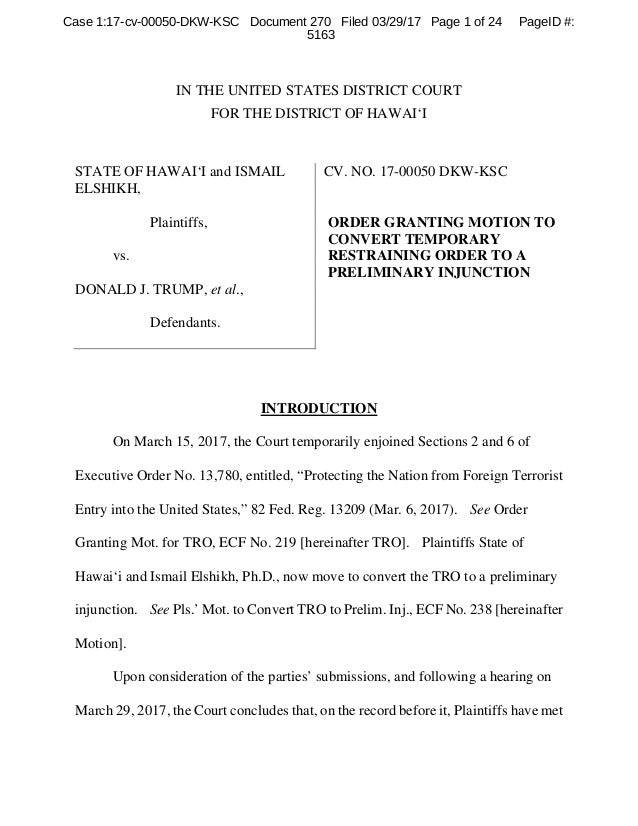Go to Original
By
The Hawaii judge who blocked President Donald Trump’s revised executive order on immigration two weeks ago extended his nationwide stay Wednesday, brushing aside the administration’s argument that the scope of his ruling was too broad.
In a 24-page opinion, U.S. District Court Judge Derrick Watson ruled that the administration offered no new arguments to change his mind.
“National security is unquestionably of vital importance to the public interest,” Watson wrote. “The same is true with respect to affording appropriate deference to the president’s constitutional and statutory responsibilities to set immigration policy and provide for the national defense. Upon careful consideration of the totality of the circumstances, however, the court reaffirms its prior finding that the balance of equities and public interest weigh in favor of maintaining the status quo.”
The legal question before Watson was whether his temporary restraining order, issued just hours before the travel ban was to take effect March 16, should be turned into a preliminary injunction — a longer-lasting stay that will remain in place until the case is resolved.
Last week, the state Department of the Attorney General filed a request for the longer injunction, noting that the standards for issuing both injunctions are “substantially identical.”
In an hour-long hearing Wednesday, the administration opposed Hawaii’s request, arguing that Watson’s ruling should at least be narrowed.
Acting Assistant Attorney General Chad Readler, who phoned in from Washington, D.C., urged Watson to exempt key parts of the revised order — one provision that suspends refugee resettlements, as well as several subsections of another provision that temporarily halts the issuance of new visas to citizens of six Muslim-majority countries.
Readler focused his argument largely on Hawaii’s standing to sue, saying that the state can point to no specific injury for a broader ruling.
Readler told Watson that Hawaii has done too little with refugees to have standing — accepting only 20 out of the 538,297 refugees who have been resettled in the United States during the past eight fiscal years.
The argument didn’t get much traction with Watson, who snapped: “Is this a mathematical exercise? That 20 isn’t enough, but 25 is? … What do I make of that?”
Readler persisted, urging Watson to take into account the narrower rulings from other jurisdictions that exempt the refugee provision.
Hawaii Attorney General Doug Chin told Watson that the travel ban was still “infected” with “religious animus” against Muslims — in violation of the First Amendment’s establishment clause.
“The religious animus taints the entire policy,” Chin said, calling attention to Trump’s statements that the revised order is a “watered-down version” of the original travel ban. “It’s as if there’s a flashing neon sign behind them saying ‘Muslim ban, Muslim ban.'”
“We cannot fault the president for being politically incorrect, but we do fault him for being constitutionally incorrect,” Chin added.
In his ruling, Watson rejected the administration’s argument that he shouldn’t “look beyond the four corners of the executive order” to assess whether it violates the First Amendment.
“No binding authority … has decreed that establishment clause jurisprudence ends at the executive’s door,” Watson wrote. “In fact, every court that has considered whether to apply the establishment clause to either the executive order or its predecessor (regardless of the ultimate outcome) has done so.”
Watson sided with Chin, observing that the “historical context” of the travel ban is “full of religious animus, invective and obvious pretext.”
“It is no wonder that the government urges the court to altogether ignore that history and context,” Watson wrote. “The court will not crawl into a corner, pull the shutters closed, and pretend it has not seen what it has.”
Waton also concluded that it “makes little sense” to narrow the scope of his ruling.
“That is because the entirety of the executive order runs afoul of the establishment clause where ‘openly available data support a commonsense conclusion that a religious objective permeated the government’s action,'” Watson wrote.
The ruling essentially leaves the administration with two options — either to appeal it to the 9th U.S. Circuit Court of Appeals, which upheld an injunction issued by a federal judge in Seattle against the original travel ban, or let it stand while defending the revised order on the merits.
In a statement, Chin hailed Watson’s ruling:
This is an important affirmation of the values of religious freedom enshrined in our Constitution’s First Amendment. With a preliminary injunction in place, people in Hawaii with family in the six affected Muslim-majority countries — as well as Hawaii students, travelers, and refugees across the world — face less uncertainty. While we understand that the President may appeal, we believe the court’s well-reasoned decision will be affirmed.
Read Watson’s ruling here:



No comments:
Post a Comment